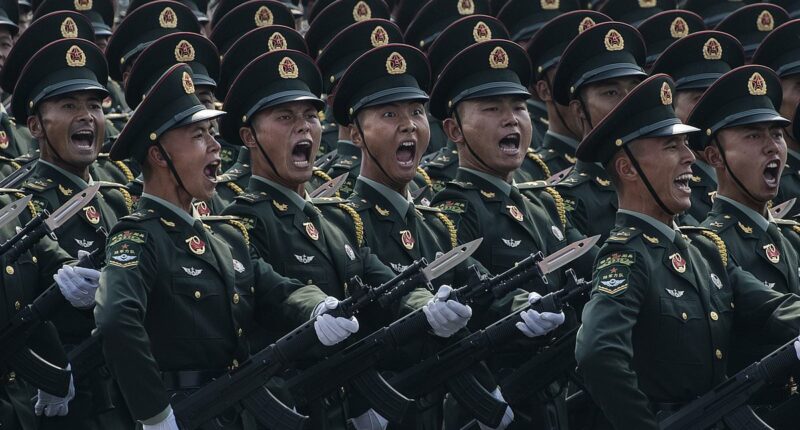Share this @internewscast.com
A young expectant mother decides, upon her doctor’s advice, to undergo a genetic test for her unborn child. “What harm could it do?” she ponders. The test is noninvasive, widely approved, and millions of women have already opted for it. However, this isn’t just any biotech innovation, and the genetic data involved is being used for more than just routine medical studies.
The test in question, known as the NIFTY test, is a product developed by BGI Genomics, a company based in China. Its development was supported by the People’s Liberation Army.
While the test is designed to screen for conditions like Down syndrome and other chromosomal abnormalities, the genetic information it gathers also serves purposes aligned with the Chinese military’s interests, including a disturbing initiative referred to as ‘improving population quality.’
Although the NIFTY test has yet to receive approval in the United States, it is accessible in other regions around the world, such as Europe, Canada, and Australia.
With a career rooted at the intersection of intelligence and technology, I understand the complexities at play. As a young man, I served as a CIA-trained case officer, conducting operations in Iraq and other countries worldwide.
I have spent my career at the crossroads of intelligence and technology. As a younger man I was a CIA-trained case officer, operating on the ground in Iraq and other countries around the world.
Later, as the Chief Technology Officer of the National Geospatial-Intelligence Agency (NGA), I was responsible for introducing the use of AI to analyze satellite imagery and data from other sources like drones. We worked hand in hand with other top secret intelligence agencies and special operations units to help keep our country safe from enemies. And the most serious threat I’ve seen comes not from the terrorists and insurgents I faced in Baghdad. Our biggest adversary by far is now China.
Unlike our enemies in the past, China is just as likely to target my wife and son as it is intelligence officers, or the military or politicians who run our nation.

The NIFTY test – a brand-named product of BGI Genomics – was developed in China , with the support of the People’s Liberation Army. (Pictured: BGI Genomics laboratory in 2018)
Those threats emanate from the cell phone I carry, from my son’s video game system, from our healthcare system, our banks and our television sets.
The case of BGI Genomics is terrifying enough, but it doesn’t just affect mothers. Reuters reported that this same company has sold millions of COVID tests globally, including into the American market.
And the Chinese Communist Party can legally take any information, any data it wants, from any Chinese company.
So your genetic information could be used to create a class of super soldiers, or even super geniuses, in China.
Even scarier: China could create diseases that affect only specific ethnic populations.

Anthony Vinci is a former senior intelligence officer and the author of The Fourth Intelligence Revolution: The Future of Espionage and the Battle to save America
These threats from the East are not just limited to genetic testing.
Your cellphone has almost certainly been hacked by a Chinese intelligence officer, and perhaps your text messages have been viewed by someone in Beijing.
That information could be used to one day blackmail you or someone in your family. Or target an information operation against you, to disrupt our democracy or otherwise harm our interests.
If you or your friend or child have used TikTok, you have likely been a part of a covert influence campaign. Moreover, it is likely that campaign worked, as researchers at the Rutgers University Miller Center on Policing and Community Resilience and the Network Contagion Research Institute have shown that those who used the app most have more positive views regarding China’s human rights record.
Artificial intelligence will present an entirely new threat. Already China has launched an AI system called DeepSeek that is available right now on the app store. It’s been shown that this app censors information the CCP disapproves of.
Such AI systems could also be used to ‘hack our minds’ by subtly presenting, censoring, or changing information over long periods of time.

So your genetic information could be used to create a class of super soldiers, or even super geniuses, in China

Your cellphone has almost certainly been hacked by a Chinese intelligence officer, and perhaps your text messages have been viewed by someone in Beijing

It could ‘incept’ an idea, just like in the Christopher Nolan movie. Over years it could convince you that violence is an acceptable form of political discourse, or that you should no longer vote. These threats would be generational in nature.
Already, children are being raised with AI around them, interacting with ChatGPT and other systems like they are people. Imagine one of these systems was infiltrated by the Chinese Ministry of State Security or another adversary and they implanted information, slowly incepted ideas, beginning when someone was a toddler. This makes the Manchurian Candidate seem downright tame.
This is the new world of espionage.
The best thing we can do is to fight fire with fire and begin to think like a spy.
Here are five ways to protect yourself:
- Consider operational security like a case officer. Take a second whenever you’re posting something online or providing information to someone and consider whether it’s safe. You’d be surprised what people can figure out about you just by looking at your bedroom behind the picture. Even one second is enough to reconsider.
- Triangulate like an analyst. When in doubt about something you heard, always search out and find additional pieces of media, preferably from totally different sources to compare. If Fox, CNN, The Wall Street Journal, Newsmax and the South China Sea Morning Post all say the same thing, that’s a good proxy for it being real.
- Add cost and friction like a counterintelligence officer. We will never be completely secure but you can deter bad guys by making it harder to target you. Use encryption to transmit truly important information. Don’t use the same passwords across sites. If you signal that you are much more protected, the enemy may move on to the next, easier, target.
- Adopt new technology like an S&T Officer. Science and Technology (S&T) Officers at the CIA invented some of the most devious spy devices ever, but before they used any of it, they considered the risks. We are seeing new AI and other technologies every day. Before you jump right in, take a minute to research the downsides of the new technology and ask yourself whether the tradeoff is worth it.
- Think like a spy. When you are an intelligence officer, you always need to remember that you aren’t alone, there is an adversary, and they are trying to deceive you and to spy on you as much as you are trying to spy on them. Unfortunately, there are bad guys out there trying to deceive us all. That doesn’t mean living a paranoid life. But it does mean being a little cynical and having situational awareness. Always look for the signs that something seems off and consider whether someone might be looking over your shoulder.
We are in the midst of a revolution in intelligence where we are now all the targets of espionage, whether we like it or not.
A few simple rules of thumb can help protect you, your friends, family, community and nation in a new world where espionage threatens us through our phones, our computers and even our DNA.
Anthony Vinci is a former senior intelligence officer and the author of The Fourth Intelligence Revolution: The Future of Espionage and the Battle to save America.

















